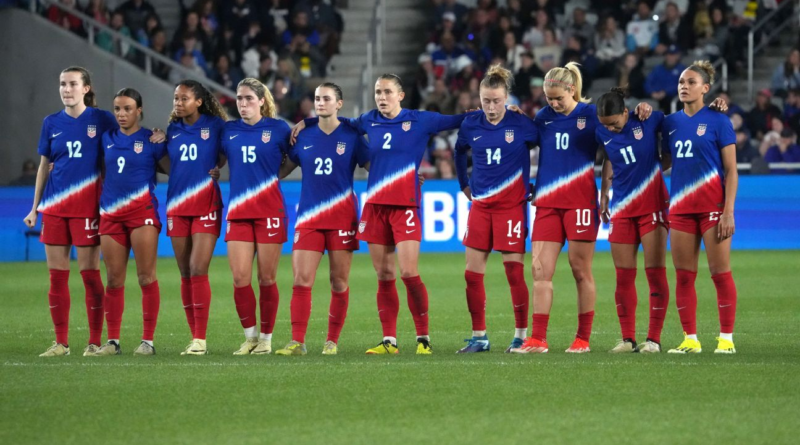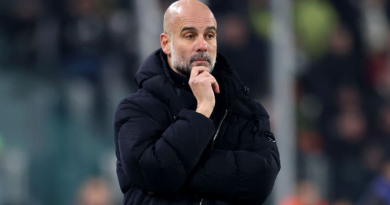Awaiting Emma Hayes: how the USWNT deal with playing with no coach
The longest transition period in United States women’s national team history came to an end last week with a penalty shootout victory over Canada in the SheBelieves Cup final. The result (officially a draw) left interim head coach Twila Kilgore with a 10-1-3 record in 14 games in charge, twice as many matches as the previous longest interim stint for a USWNT coach.
This transition, following the USWNT’s worst major tournament finish in history at last year’s World Cup, is unlike anything the program has dealt with before. It has been undeniably awkward — not like 2007, when new coach Pia Sundhage famously gathered her divided team for the first time, pulled out her guitar, and sang Bob Dylan’s classic, “The Times They Are A-Changin'” — but in the form of an anxious, extended wait.
New coach Emma Hayes will finally be on the sideline at the next USWNT training camp, which begins on May 27 outside Denver. Hayes was hired in November, but negotiated with U.S. Soccer to finish the European season with Chelsea, a club she has built into a powerhouse over the past decade. U.S. Soccer was widely lauded for making the best possible hire, but there was no denying it: the unprecedented waiting period has hardly been ideal for anyone.
– Stream on ESPN+: LaLiga, Bundesliga, more (U.S.)
“I don’t want to say [it’s] uncomfortable, but it is just weird,” USWNT forward Trinity Rodman said recently, speaking to recently retired midfielder and 2019 World Cup winner Sam Mewis on a podcast. “There is very, very limited communication, and it’s the communication from Twila to us. So, it’s like you’re being scouted all the time, almost.”
U.S. Soccer’s tacit compromise is that the federation was willing to sacrifice the 2024 Olympics with an eye toward winning the 2027 World Cup — potentially on home soil — and that Hayes was best suited for the job. Despite the team’s relative success in recent months, the looming question is whether this sluggish overhaul — “a kind of purgatory,” as Mewis aptly described it on another podcast episode — stunts the growth of the team. Players, many of whom are relatively new to the environment, are at the center of that uncertainty.
“I think there’s a lot of change that’s happening right now,” USWNT midfielder Sam Coffey told ESPN last week. “There’s a lot of uncertainty, there’s a lot of factors out of our control, and that’s just kind of professional sports all the time. For me, personally, the more that I just focus on playing and being my best and the highest version of myself every day, that’s what I can control.”
Coffey is arguably one of the players most firmly in the crosshairs of this change. She is a bubble player who did not make the 2023 World Cup roster, but who appears to have recently asserted her value as one of the team’s reliable defensive midfielders, starting each of the past six matches. Focusing on the “controllables” is a common refrain among professional athletes, but the phrase has a more authentic ring to it amid the USWNT’s current state of flux. Even veteran players find themselves in the same thought processes.
“I think we all know that nothing is guaranteed as a new coach comes in,” defender Tierna Davidson told ESPN. “So, I think everyone is trying to put their best foot forward but also understanding that it is an unorthodox time for us as players and the coaching staff, the technical staff as a whole. So, just allowing a little bit of grace for that I think has been important during this time.”
Adding to the mystery around the USWNT is Hayes’ focus on Chelsea until her time there officially ends. She briefly visited USWNT camp for introductions in December, but has otherwise watched from a distance — the occasional Twitter reply confirming she’s stayed up late in England to see some USWNT games live — and she has declined to go into too much depth about her next job.
— Emma Hayes OBE (@emmahayes1) March 4, 2024
Kilgore, meanwhile, has been tasked with laying the groundwork for Hayes so that the new boss doesn’t start from scratch just two months ahead of a major tournament. It’s an important task for Kilgore, who repeatedly deflected moments for personal reflection in recent weeks and months to instead focus on the players. To be fair, the approach appears to be working. The USWNT won the Concacaf W Gold Cup just over a month before the SheBelieves Cup, defeating or advancing past teams that qualified for the Olympics in five straight matches combined.
“Change has been on the horizon for a long time,” Kilgore said moments after winning the SheBelieves Cup.
“They understand that change is coming and to do all of this with a lot of uncertainty, I just think they deserve so much credit for how they’ve operated, the professionalism, the way they’ve controlled the controllables. Even though everybody is excited for Emma to come and we’re all ready for her… it’s hard. Uncertainty is hard.”
Only Hayes and Kilgore know the true number of hours they have put in together over the past few months. Hayes has collaborated with Kilgore to select the recent USWNT rosters, which indicates that recent rosters are part of Hayes’ longer-term vision. The two have met in person in London to plot out the future, which will include Kilgore moving to an assistant role. There have been signs of a Hayes-coached team in recent games, from a more aggressive style of play to experimentation with the team’s shape, including a three-back at times.
Ultimately, however, Kilgore has overseen camps from the moment players arrive, and each match from the opening whistle. Rodman’s rhetorical question to Mewis in last month’s podcast asked what many from the outside wonder, too: Will there be a disconnect between what Kilgore says and what Hayes wants? Rodman quickly said that she doubts that is the case, but it is impossible to remove the question from the situation until Hayes arrives.
“Twila obviously is her own coach and she’s been brought in to be the interim [coach], and she has her own points being the actual coach in the camp,” Rodman said on Mewis’ podcast. “But at the end of the day, it’s like, does Emma want all the same things that Twila is wanting in this moment in time? Or are things going to change as soon as she comes in, and she’s going to want a completely different thing?”
Compounding the feeling of persistent change around the team are the injuries and recovery processes of several top players. Forwards Mallory Swanson and Catarina Macario returned to the field for the USWNT earlier this month after one- and two-year absences, respectively, due to knee injuries. Each player was to be a focal point of the previous USWNT rebuilding process, but neither made it to the 2023 World Cup.
“Anytime you come into a national team environment, there’s always a standard that you need to meet,” Swanson said. “And so, for me personally, I’ve definitely have had — just tactically and technically — you just kind of have to get caught up to speed at a faster pace.”
Hayes will need to provide stability upon her official arrival in the USWNT’s locker room next month. There are parallels between the team’s 2007 World Cup semifinal implosion and its round-of-16 exit at the 2023 World Cup, but the more intense and direct Hayes is nothing like Sundhage, the last coach tasked with managing a moment like this. (Sundhage led the team to the 2008 Olympic gold medal in her first full year in charge.)
In recent Chelsea news conferences, Hayes has recited metaphors from Star Wars, grade-school lessons with her child, and a Robert Frost poem. Last week, Hayes read from Frost’s “Choose Something Like a Star.” She was answering a very different question about her recent sideline behavior, but the message might apply to the USWNT right now, too: “So when at times the mob is swayed, to carry praise or blame too far, we may choose something like a star, to stay our minds on and be staid.”
As Coffey said last week, the more she focuses on the things outside of her control — “the kind of chaos around us” — the more she will stray from playing at her peak. Stringing together great performances and building momentum is the goal, she said: “I think the more we’re able to do that, we’re unstoppable.”






